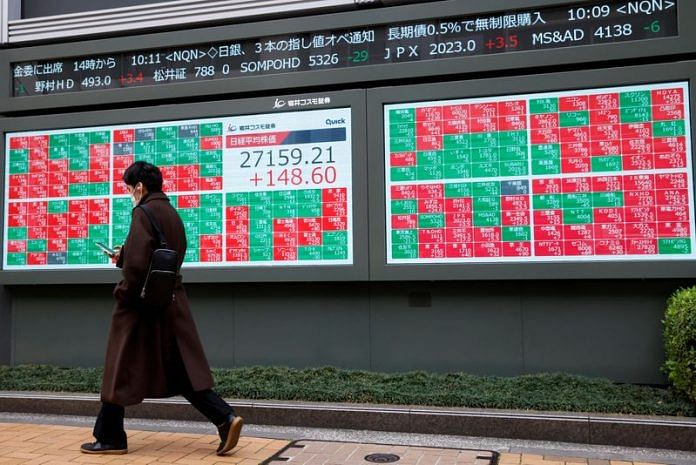By Kevin Buckland
TOKYO (Reuters) – Asian stocks slid on Thursday as chip-sector stocks tracked overnight declines by Wall Street peers, while Facebook owner Meta Platforms and Microsoft both warned of accelerating costs for artificial intelligence.
That stoked worries for the same from Amazon, which reports earnings along with Apple later in the day.
The yen rose from near a three-month low against the dollar, with the statement accompanying the Bank of Japan’s as-expected on-hold decision on Thursday containing some hawkish undertones, spurring some analysts to flag the possibility of a December interest rate hike.
More broadly, the dollar was taking a breather, having pulled back from a near three-month peak to major peers on Wednesday.
Investors were also treading warily ahead of U.S. non-farm payrolls data on Friday, the presidential election next Tuesday and a Federal Reserve policy decision on Thursday.
Japan’s Nikkei share average ended the day down 0.5%. South Korea’s Kospi dropped 1.5%.
North Korea stirred regional tensions by test firing what a U.S. official said was an intercontinental ballistic missile on Thursday.
Hong Kong’s Hang Seng added 0.3%, and mainland Chinese blue chips rose 0.2%, reversing an earlier decline, after surveys on manufacturing and services in China did show some pick up in activity.
Investors are awaiting more clarity on stimulus from Beijing next week, when officials convene a week-long congress.
Taiwanese markets were shuttered due to a typhoon.
S&P 500 futures eased 0.5%, while Nasdaq futures dipped 0.8%. The Philadelphia SE semiconductor index slumped 3.35% overnight, with Advanced Micro Devices tumbling more than 10% following dour forecasts.
EUROSTOXX 50 futures and DAX futures both eased about 0.4%, while FTSE futures fell 0.3%.
“Sentiment is shakier this morning,” said Michael Brown, a senior research strategist at Pepperstone.
“Meta’s increasing capex on AI technology exerted pressure, as risks around the theme continue to become more two-sided,” he said. “This, of course, tees things up in somewhat precarious fashion for Nvidia earnings.”
AI darling Nvidia is the last of the so-called “Magnificent 7” megacap tech companies to report earnings, in about three weeks from now. Tesla reported last week, with Alphabet following on Tuesday.
TOUGH MONTH FOR YEN
The U.S. dollar index was steady at 104.10 following its pullback from the highest since Aug. 2 at 104.63 reached on Tuesday.
The dollar eased 0.4% on the yen to 152.80, although that was still not far from this week’s high of 153.885.
Nikko Asset Management’s chief global strategist, Naomi Fink, noted “some hawkish rhetoric” in the BOJ’s policy statement, including “inflationary risks biased toward the upside” for next fiscal year.
“I wouldn’t rule out a December rate hike, especially if the yen weakens further,” she said.
The dollar is still up a heady 6.4% so far in October as political uncertainty in Japan following the coalition government’s lost majority in parliamentary elections at the weekend, which potentially delays BOJ policy normalisation.
“Japan’s messy political situation is a boon for currency speculators,” said Shoki Omori, chief Japan desk strategist at Mizuho Securities. But for the most part, “the ball is on the dollar side,” he said.
“If the U.S. sees more mixed data, we might see higher volatility in the pair,” Omori said. “Non-farm payrolls is going to change the picture if it comes out completely different from consensus.”
The personal consumption expenditures index, the Fed’s preferred measure of inflation, is also due later on Thursday.
Meanwhile, in the final stretch of the U.S. presidential contest, opinion polls still put Republican Donald Trump and Democrat Kamala Harris neck-and-neck, although financial markets and some betting platforms have been leaning towards a Trump victory.
Gold reached a fresh all-time high of $2,790.15 per ounce.
Oil prices extended a rally from Wednesday, driven by optimism over U.S. fuel demand following an unexpected drop in crude and gasoline inventories. [O/R]
Brent crude futures gained 0.6% to $72.99 a barrel and U.S. West Texas Intermediate crude futures climbed 0.7% to $69.05 per barrel. Both contracts rose more than 2% in the previous session.
(Reporting by Kevin Buckland in Tokyo and Wayne Cole in Sydney; Editing by Jamie Freed and Sonali Paul)
Disclaimer: This report is auto generated from the Reuters news service. ThePrint holds no responsibilty for its content.



